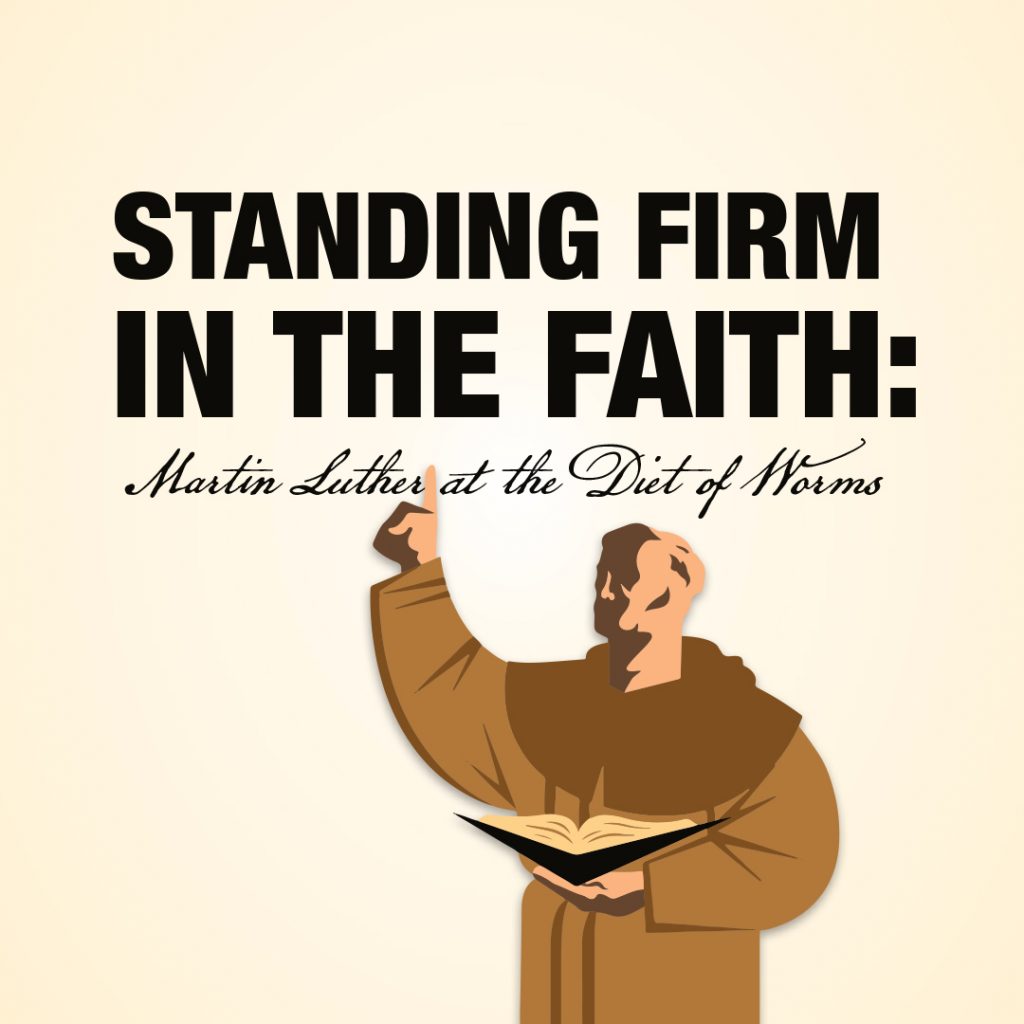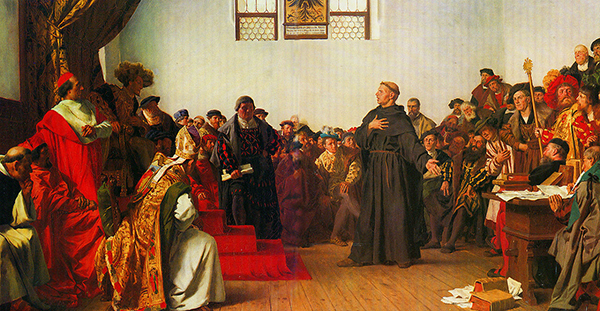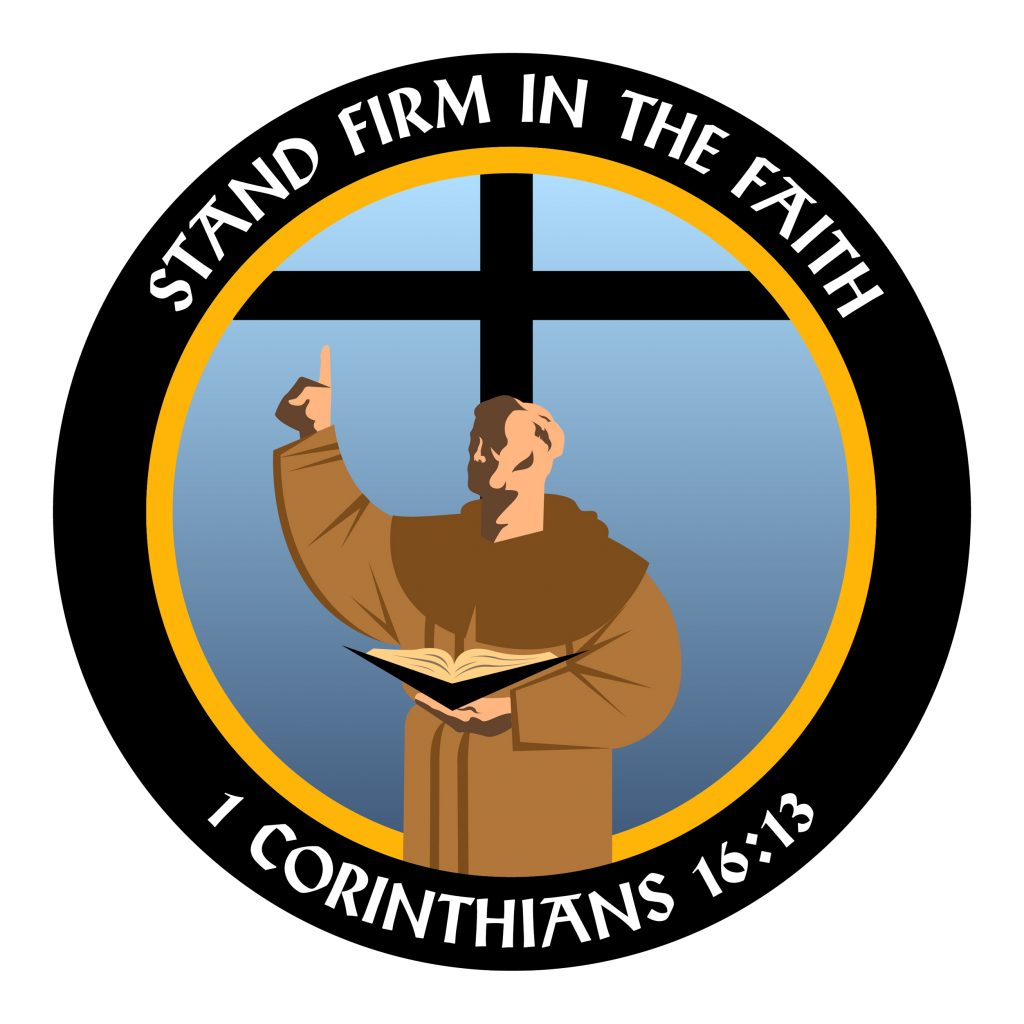Standing Firm in the Faith: Martin Luther at the Diet of Worms
 by John A. Maxfield
by John A. Maxfield
The theme of our meeting together as Lutheran Church–Canada is “Stand Firm in the Faith,” and I have been asked to address our convention on the topic of Martin Luther’s famous stand at the Diet of Worms in April of 1521. For Martin Luther at the Diet of Worms, standing firm in the faith meant standing firm in his confession of the Word of God in defiance of the authorities of the Church, who had condemned his teaching as heresy but in so doing had actually condemned the Word of God.
The “Luther Affair” (as it came to be called) had culminated already by June of 1520 in the decision of the pope to excommunicate Luther as a heretic. That excommunication formally occurred on January 3, 1521. The Church had spoken, and the pope’s decision was final.
So why did Martin Luther travel three months later to the Diet of Worms? And what was the purpose and meaning of Luther’s speech at the diet that we commemorate through our convention theme, “Stand Firm in the Faith”? Briefly stated: condemned by the authorities of the Church, Martin Luther travelled to Worms to be heard by the authorities of the State—the rulers, the politicians of what was called the Holy Roman Empire of the German Nation.
The day after his arrival in Worms, Luther was called to stand before the emperor and the estates. Johann von der Ecken, general secretary of the bishop of Trier, had been chosen as the spokesman for the emperor during the hearing. Secretary Eck stated: “His imperial majesty has summoned you here, Martin Luther, for these two reasons: first, that you may here publicly acknowledge if the books published so far under your name are yours; then, whether you wish all these to be regarded as your work, or whether you wish to retract anything in them.”
“I ask by the mercy of God,” [Luther] said, “bear witness, expose my errors, overthrowing them by the writings of the prophets and evangelists. Once I have been taught I shall be quite ready to renounce every error, and I shall be the first to cast my books into the fire.”
Luther acknowledged that they were all his and stated, “I shall never deny any of them.” But the second question—whether he would recant what he had written—was more difficult. Luther answered: “Because this is a question of faith and the salvation of souls, and because it concerns the divine Word, which we are all bound to reverence, for there is nothing greater in heaven or on earth, it would be rash and at the same time dangerous for me to put forth anything without proper consideration… For this reason I beseech your imperial majesty for time to think, in order to satisfactorily answer the question without violence to the divine Word and danger to my own soul.”
Luther was upbraided by Eck for not being prepared to give an answer immediately. But the emperor was gracious; he gave Luther one day. The next day, Luther was escorted once again to the bishop’s residence, where the proceedings were taking place, now in a larger hall and with a larger crowd present. Eck once again addressed Luther, chiding him for being unready the previous day to give his answer: “Come then; answer the question of his majesty, whose kindness you have experienced in seeking time for thought. Do you wish to defend all your acknowledged books, or to retract some?”
In answer to the question about whether he would retract what he had written, Luther replied that his books were not all of the same kind. “For there are some in which I have discussed religious faith and morals simply and evangelically, so that even my enemies themselves are compelled to admit that they are useful, harmless, and clearly worthy to be read by Christians.” To recant these writings was out of the question.

Martin Luther at the Diet of Worms (Anton von Werner, 1877).
“Another group of my books,” Luther continued, “attacks the papacy and the affairs of the papists as those who both by their doctrines and very wicked examples have laid waste the Christian world with evil that affects the spirit and the body… If, therefore, I should have retracted these writings, I should have done nothing other than to have added strength to this tyranny and I should have opened not only windows but doors to such godlessness.” Here Luther was aptly characterizing the substance of his increasingly vigorous criticism of the pope and the papal church over the past three years, and he was refusing to back down.
Luther then went on to identify a third kind of book that he had written: books “against some private and (as they say) distinguished individuals—those, namely, who strive to preserve the Roman tyranny and to destroy the godliness taught by me.” Of these, Luther said: “I confess I have been more violent than my religion or profession demands.” Yet even while acknowledging his fault of provocation and violent language in certain of his writings—these writings addressed to churchmen—Luther stood firm in his faith and refused to compromise. The question at hand was not Luther’s opinions or Luther’s interpretation of the Bible or Luther’s manner of responding to his opponents; the question at hand was the teaching of Christ.
“I ask by the mercy of God,” he said, “bear witness, expose my errors, overthrowing them by the writings of the prophets and evangelists. Once I have been taught I shall be quite ready to renounce every error, and I shall be the first to cast my books into the fire.”
When Luther had finished his speech, the imperial spokesman reproached him once again for straying from the issue at hand. Once again Eck demanded a simple answer: would he or would he not recant?
Luther replied: “Since then your serene majesty and your lordships seek a simple answer, I will give it in this manner… Unless I am convinced by the testimony of the Scriptures or by clear reason (for I do not trust either in the pope or in councils alone, since it is well known that they have often erred and contradicted themselves), I am bound by the Scriptures I have quoted and my conscience is captive to the Word of God. I cannot and I will not retract anything, since it is neither safe nor right to go against conscience. I cannot do otherwise, here I stand. May God help me, Amen.”
These are the words that have reached legendary status and would come to define the Protestant Reformation. This is the moment that in later generations would be remembered as the scene that displayed the essence of the Reformation: Luther standing firm in his faith, refusing to recant, defiant before the powers of the day and determined to confess the truth of the Word of God even should it mean his condemnation to death or exile.

Luther demanded that he be convinced of his errors by testimony from Scripture and clear reason. Luther was not asserting that his own personal interpretation of Scripture had more authority than the interpretations of popes and councils. Instead, he was demanding that his teachings be refuted by Scripture and reasonable arguments based on the Bible. Luther’s appeal to Scripture as the highest authority became the sola scriptura or “Scripture alone” principle of the Reformation, and this continues to be the principle of authority for Christian teaching for Lutherans today.
As Christians of Lutheran Church–Canada, we will stand firm in our faith only so long as we stand firm on Scripture alone, confessing “that the only rule and guiding principle according to which all teachings and teachers are to be evaluated and judged are the prophetic and apostolic writings of the Old and New Testaments alone” (FC Ep. Rule and Norm 1).
In later centuries, Luther’s appeal to conscience was interpreted as an appeal to personal freedom and autonomy. But in his speech and in the discussions that followed, Luther appealed not to a free conscience but to a bound conscience: “I am bound by the Scriptures I have quoted and my conscience is captive to the Word of God.” We in Lutheran Church–Canada today will experience a similar freedom from the tyrannies of our age—tyranny over religious freedom, tyranny over freedom of conscience guided by the Word of God, tyranny over freedom to think and believe according to our faith in Christ in defiance of the manifest idolatries of our society and the political systems of our age—we will experience freedom as Luther did only as we stand firm in our faith as Luther did, subject to Christ Jesus as our only Lord, free in Christ as our consciences are captive to the Word of God.
The significance of Luther’s stand at the Diet of Worms was that his confession of faith became a reform movement that changed Christianity, despite condemnation by the authorities of both Church and empire. Martin Luther began leading this reformation while in exile—the most important fruit of which was the Reformer’s translation of the New Testament into German, the language of the people. Luther’s followers took up his bold confession of God’s Word and make it their own, so that one of the rallying cries of the Reformation became “God’s Word and Luther’s doctrine.” The princes who supported Luther’s Reformation would within a decade wear as a badge of honour the motto, “The Word of God Endures Forever.”
As Christians of Lutheran Church–Canada, we will stand firm in our faith only so long as we stand firm on Scripture alone, confessing “that the only rule and guiding principle according to which all teachings and teachers are to be evaluated and judged are the prophetic and apostolic writings of the Old and New Testaments alone” (FC Ep. Rule and Norm 1).
Those outcomes of Luther’s stand at Worms carry on today as Lutherans throughout the world continue to confess and proclaim God’s Word. We in Lutheran Church–Canada “Stand Firm in the Faith” as we proclaim the freedom of every Christian to confess Jesus Christ as Lord, to the glory of God the Father, our consciences captive to the Word of God in defiance of every human tradition and authority that distorts or obscures the Gospel—just as Luther’s conscience was captive to God’s Word at Worms and throughout his lifetime. Our present and future as heirs to Luther’s Reformation—our existence and flourishing as the Lutheran Church—is secured only by standing firm in our faith as Luther did, looking to God and believing His promise that the gates of hell itself will not prevail against the assembly of believers who hold the keys to the kingdom of heaven (Matthew 16:15-20).
———————
Rev. Dr. John A. Maxfield is Associate Professor at Concordia University of Edmonton. This article is adapted from his presentation at Lutheran Church–Canada’s 2022 synodical convention.
You can also watch the presentation via our YouTube Channel in our 2022 LCC Synod Convention Playlist.





